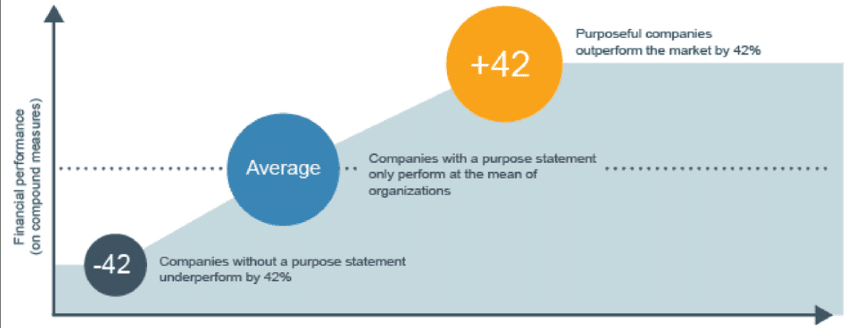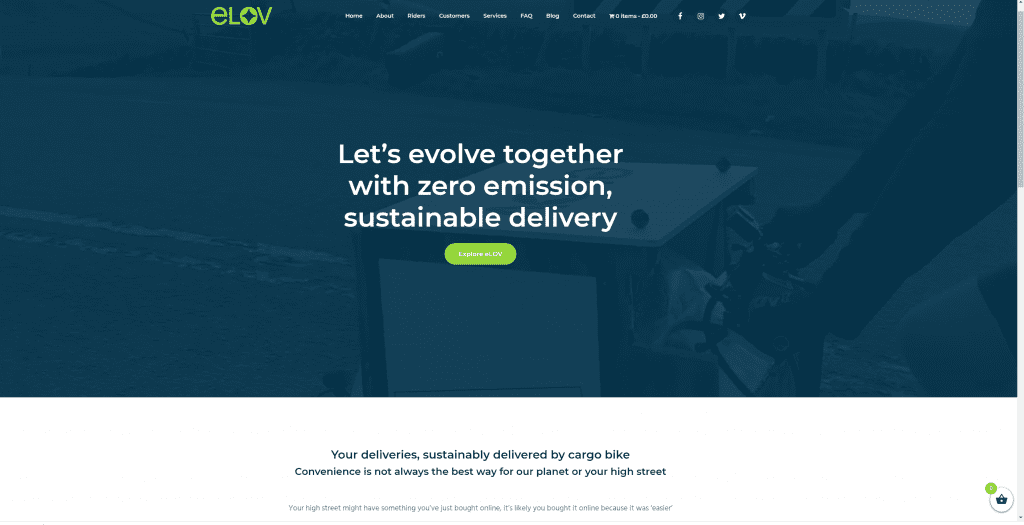Why Purpose Matters In Business.
I want to take just a couple of minutes of your time by asking you to consider if Purpose is just a buzz word or does it really make a difference in business? And more importantly can it make a difference in Your Business?
What is Purpose?
If you look in the dictionary, purpose is defined as:
- “ the reason for which something is done or created or for which something exists”
- “ a person’s sense of resolve or determination.”
Some psychologists, refer to purpose as
“an abiding intention to achieve a long-term goal that is both personally meaningful and makes a positive mark on the world.”
From a business perspective, a purpose-driven company stands for and takes action on something bigger than its products and services.
It’s a concept which has been talked about a great deal in the last few years, with popular TED talk such as Simon Sinek’s “ Start with WHY” and many large corporates reporting that it is crucial to business success yet there still appears to be a huge gulf between their big bold ideas and what is actually implemented.
However, given the general popularity of the concept and the widespread acknowledgement that it probably is something we should all consider, let’s have a look at the evidence so far.
Are purpose driven companies more successful than others?
Consider this from the perspective of employees, customers and also financial performance.
Team Members Engagement and Performance
79% of business leaders surveyed by PwC believe that an organisation’s purpose is central to business success. Yet, 68% of leaders also shared that purpose is not used as a guidepost in leadership decision making processes within their organisation.
Perhaps this goes some way to explain that whilst companies with a ‘higher purpose’ are more than three times as likely to retain their employees. The vast majority of employees remain disengaged from work, and only 33% draw real meaning from their employer’s purpose.
Just having a company purpose isn’t enough. It has to be central to the decision making process and flow through the whole organisation.
Impact on Customers
According to research being purpose driven also aligns your business better with your customers.
Edelman’s recent Trust Survey found that 87 per cent of global consumers believe businesses should put at least as much emphasis on social interests as business ones. They also view purpose driven brands as more caring with 79% of responders claiming they are more loyal to them because of this.
Impact on Financial Performance
Given that companies with purpose better motivate employees and satisfy customers, one would expect them to also have greater business success and from a financial perspective the evidence is compelling. Some reviews suggesting that purposeful companies who embed purpose into their culture outperform the market by 42%
Does this really apply to small businesses too?
Whilst much of the research has been collated from multinational organisations there is no reason that the same principles can’t apply to small businesses. And if some of the issues are implementation and buy in then this should be even more achievable in smaller businesses. After all, if we as business owners are not connected with our company purpose then we have a real problem!
So what is stopping us from integrating purpose into our business?
For some defining our purpose is very obvious, whilst for others it’s more of a challenge. I rather like this quote from Start Up Fashion which may help with some perspective.
“This (purpose) does not have to be a massive humanitarian effort (unless you want it to be). You can have a purpose that is about making people feel beautiful or seen or understood. You can have a purpose that’s tied to your own family. Whatever it is, it’s about owning a reason for what you do that’s more than making money (not that there’s anything wrong with making money!) “
If you are still struggling to define your purpose I would encourage to persevere. Your Purpose is totally unique to you and having this up front and centre in all your communications will really help you to stand out from the crowd and attract clients that are also aligned with your Values and Purpose.
Purpose can also do more than just make your brand unique. It expresses your ambitions, your aspirations and sets an intention as to how you plan to evolve.
Which companies have integrated purpose into their business?
I had a bit of a google and found a range of businesses which did appear to have mastered the art of integrating purpose into their core business strategies.
One example was patagonia, the clothing brand, whose purpose statement is, “We’re in the business to save our home planet.” Their home page leads with their volunteering programme rather than photos of jumpers and as you explore more they do seem to show genuine commitment to their purpose.
At a local level, I have recently noticed a number of social media posts from a company called eLOV https://elov.co.uk/ a sustainable delivery company who use predominately pedal power.
However, they don’t just deliver. When out and about they collect rubbish such as discarded tyres and take them to be recycled and encourage others to report items which they can help remove, going way beyond their remit as a “cargo and freight company” but aligning with their purpose.
I’m sure you know of plenty more examples so please do share in the comments below so we can take inspiration from the innovate ways in which others have aligned their business with their purpose.
In Conclusion
Some people will still remain sceptical that purpose is just a buzz word, another marketing tool to enhance appeal and something which is OK for large companies.
However, as a business owner who has total control over how we set the course for our own business who wouldn’t want to have a company which energised and motivated our employees ( us) created value and satisfaction for clients and which had a positive impact on the world?
If you want to explore this topic and how it relates to your business, book a coffee chat and let’s discuss.
Book a Virtual Coffee




